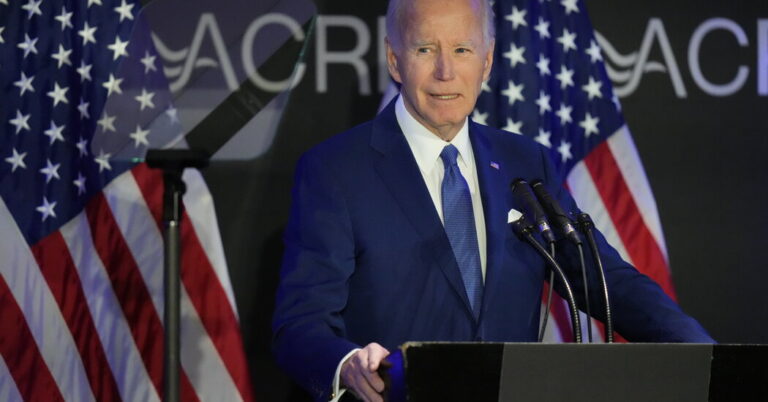
Two months after Yeshiva University said it would recognize an L.G.B.T.Q. student club on campus, bringing a yearslong legal battle to an end, the school has reversed course and banned the organization.
The school said the club, once known as the Pride Alliance but renamed Hareni earlier this year, had violated both Jewish principles and the legal settlement. But lawyers for the students said it was leaders at the school, a Modern Orthodox Jewish institution with campuses in Manhattan and the Bronx, who had violated the agreement with hostile religious rhetoric.
In a letter to the community on Friday, the university repeated an argument it made unsuccessfully in state court in 2022, saying its undergraduate programs are “fundamentally religious.”
The school said that “recent actions and statements” from the student club had led administrators to believe that it was “operating as a pride club under a different name and as such is antithetical to the Torah values of our yeshiva, as well as in violation of the approved guidelines and of the terms of the settlement agreement.”
“There is no place for such a club in yeshiva,” the letter continued, using the general term for a Jewish educational institution.
Yeshiva’s decision in March to recognize the club had seemed to end the legal battle, which had plunged a university in one of the country’s most liberal cities into a nationwide debate over religious freedom, civil rights and whether houses of worship, religiously affiliated organizations or even pious individuals could be compelled to provide public accommodations to people with differing views.
The dispute had been closely watched by religious organizations and religious freedom groups. While many Jewish congregations support L.G.B.T.Q. rights, many Orthodox leaders interpret the Torah as promoting traditional ideas of gender and sexuality.
Throughout years of legal wrangling, Yeshiva went to great lengths to deny the club official recognition, including briefly banning all on-campus clubs. As the case worked its way through the courts, it also drew the attention of state lawmakers, who criticized the university’s position and suggested it might have imperiled its ability to access public funds.
The official dissolution of Hareni comes at a time when the rights of L.G.B.T.Q. Americans appear under threat from the Trump administration, which has attacked elite universities and mounted a campaign against the participation of transgender people, in particular, in public life.
In a statement, the club said its members were “deeply disappointed by the announcement of Hareni’s cancellation,” which it said came one day after their lawyers sent a letter to the university objecting to “ongoing displays of animus and hostility” from university leadership.
The lawyers, Katherine Rosenfeld and Max Selver, said in their letter that those statements included university guidelines released last month that said the club would not be permitted to host social events, must not use “Pride flags, symbols and emojis as well as the term ‘Pride Club,’” and must include a “sexual morality” disclaimer on all its printed materials.
The students’ lawyers also said they were alarmed by hostile public statements from senior rabbis at the school, including a letter printed in a campus newspaper from Rabbi Hershel Schachter, who said he “emphatically rejects the ideology, lifestyle and behaviors which the L.G.B.T.Q. term represents.”
In another statement, a second senior rabbi, Mayer Twersky, said “the L.G.B.T.Q. acronym” represented “a heretical, nihilistic philosophy which champions and celebrates all forms of sexual deviance.”
“We must unconditionally reject their demands and can never settle,” Rabbi Twersky wrote.
In response to the letter from Hareni’s lawyers, Yeshiva lodged its own complaints against the student club, which it said had “repeatedly second-guessed and opposed Yeshiva’s spiritual leadership” since its approval in March.
The university’s lawyer said Yeshiva had not intended the legal settlement to amount to official recognition of the Pride Alliance, and that administrators were alarmed when the new club, Hareni, simply rebranded the Pride Alliance’s social media accounts.
After the March settlement, posts were made on those accounts that said the Pride Alliance “will go forward using the club name Hareni” as “an official club at Y.U.,” the Yeshiva lawyer said. The university also objected to the use of Pride flag emojis and the word “pride” in posts on those accounts, and the fact that Pride Alliance posts were still visible on them.
Officials appeared to be particularly incensed by an event they said the club held on May 7 and an opinion piece published in a campus newspaper the day before by the club’s co-presidents, Hayley Goldberg and Schneur Friedman.
In that essay, the students said they planned to hold social events despite the university’s prohibition, and that they would not affix a morality disclaimer to the club’s printed materials. They said such a statement would be “egregious.”
The student leaders also said that questions about the interplay between L.G.B.T.Q. rights and Jewish religious law, or halacha, “are valid, but they are not the issue at hand.”
In reality, they wrote, universities, clubs, presidents and Yeshiva leaders “do not determine how individuals, straight or gay, trans or cis, approach halacha.”
They added, “The individuals themselves do.”




